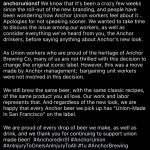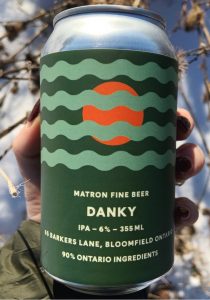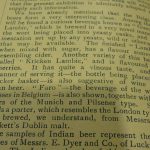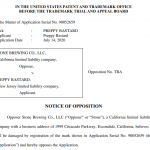Oh, to be in England now that April’s (almost) there…
Well, that was great. February, the last month in the pandemic year around these parts. March is the bestest of the months anyway so I am just moving on, planning on getting some seeds in the ground within the next few weeks. The hard frozen ground. Not like in Ypres where Stonch waits upon the law to let his garden, above, grow.
First, an interesting comment from David Frum on the duration of the shock of the new:
It’s like when distilled alcohol arrived in Europe after 1400. Human beings had long experience of wine and beer. But distilled liquor spread carnage through unprepared societies. Took a long time to learn to cope with it. Broadcast media => social media an almost equal shock
That works. Speaking of culture shock, I can’t say I agree with the idea that the folk in their early twenties are a wave of future beer drinkers just waiting to hit the beer stores for the next forty or fifty years but Matt makes an argument:
What I’m interested in flipping here is the narrative that runs through all of these stories: that under 25’s are not interested in drinking alcohol. That craft beer, specifically, is not cool to them. While the youngest bracket within the above data might be drinking less, I believe they are almost certainly drinking better. Case in point: In putting out a tweet asking for 18-24 year olds to reach out to me about their beer preferences, my inbox was overwhelmed with a flood of positivity.
That right there? The choir. My kindly response – avuncular even – was that my kids and their pals have little or no interest being tediously focused on building a healthy and productive future. Does it matter if they like what i like?
 UK Covid Pubwatch 2021 continues. Are you a little more worried each month about the role the pub and lashings of booze have on British culture? Folk are fretting. On Thursday, Emma McClarkin of the British Beer & Pub Association forewarned of Boris’s newest announcement with this:
UK Covid Pubwatch 2021 continues. Are you a little more worried each month about the role the pub and lashings of booze have on British culture? Folk are fretting. On Thursday, Emma McClarkin of the British Beer & Pub Association forewarned of Boris’s newest announcement with this:
Outdoor opening -as we told Gov- not viable option. More support will be needed to survive prolonged closure, but what we really need is to be opened fully inside & out as soon as possible.
Stonch was more realistic and more humane:
Business owners in hospitality / leisure / retail (of which I am one) will understandably feel bitter disappointment about the glacial pace of re-opening about to be set out. However we need to be realistic and remember this is how most of the public want things to go.
This was cool. A 1989 record from Mass Observation. Typed. Might as well have been 1949. Reminds me. I knew a guy called Bob in the mid-90s who went on about enjoying life, smoking and drinking. Died from smoking and drinking in the mid-90s. More to enjoying life than stubbing it out like a butt in an ashtray.
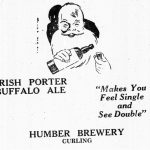 And Martyn added Curling, Newfoundland to my understanding. Now part of Corner Brook. I don’t actually think it’s the worst slogan ever. We’d do well to have a lot more “Alcohol: makes you an idiot” reminders. So, more like a public service announcement. Might’ve helped Bob.
And Martyn added Curling, Newfoundland to my understanding. Now part of Corner Brook. I don’t actually think it’s the worst slogan ever. We’d do well to have a lot more “Alcohol: makes you an idiot” reminders. So, more like a public service announcement. Might’ve helped Bob.
An old link but an interesting one – Ottawa’s first tavern unearthed.
Here’s a lengthy post from Martyn which has little to do with beer but a lot to do with the state of understanding of beer:
Of course, having a “gut instinct” that something is or is not true, after our subconscious minds have reviewed the evidence and decided whether the arguments hold up, does not absolve us of the need to muster the evidence for others to review, because other people cannot interrogate our subconsciouses. The evidence for the two sides of the “porter name origins” argument is pretty easy to line up.
My first response was unkind as it the question was not the origins of the name of porter but the ethics of going on and writing about junkets rather than spreading one’s attention more equitably, well, facts and standards would not have such sway. But I am intrigued by the fact that “Daniel Defoe wrote in 1724 of porter being a working-class, alehouse drink” so I can overlook such things.
Elsewhere in taxonomy, Katie wrote extensively about small bready lumps in the UK.*
It’s a first date question. It’s something to debate over pints and a cheese and coleslaw bap. It’s an argument in the kebab shop at 1 a.m. It’s a reason to fall out with a favourite baker when they revise their packaging. It’s a clichéd social media meme and an easy engagement win. People queue up to die on the already heavily-bodied hill that is the true and rightful name of their favoured handheld breadstuff. We love to claim the naming rights of our daily bread. It’s personal. It’s tribal.
This article reminded me of when in 1991 as a ESL teacher in Kołobrzeg, Poland I invented a game of twenty questions for my adult evening class. They found posing oneself as an object to be asked questions was a very odd process. Apparently it was not something Stalin had mentioned might assist in expanding understanding. They also found it very odd when I proclaimed the correct answer: “jestem buka!” Or “I am a bun!”
And Stan waxed taxonomically when he picked up the “what was craft?” theme rather helpfully – in the sense that it is now a past tense discussion even if five years after the real endy times struck:
If we are going to “use 2020-’21 as a convenient place to divide the ‘craft era’ with whatever we’re about to inherit” who is in charge of coming up with a title for the next chapter?
Stan (for the double) also wrote of Kentucky Common, which I semi-secretly consider likely an echo of schenk.
And finally, over at the Beeb, the plight of the most remote pub on the mainland of Britain was discussed:
Locals have launched a bid to bring Britain’s remotest mainland pub into community ownership. The Old Forge in Inverie sits on the Knoydart Peninsula in Lochaber. The only way of reaching the village – and its pub – is by walking 18 miles (29km) or making a seven-mile (11km) sea crossing. The pub’s owner told residents in January of their intention to sell up, and following a consultation locals say they are keen to buy it.
Keeners. There. Soon it will be March. Feel free to dream of planting seeds. Peas and lettuce can take a frost. And while you are, for more good reading, check out the weekly updates from Boak and Bailey, back now mostly every Saturday, plus more at the OCBG Podcast on Tuesday (Jordan weights apology as opposed to apologia over beer cocktails this week!) and sometimes on a Friday posts at The Fizz as well. We have a new entry from the DaftAboutCraft podcast. And sign up for Katie’s weekly newsletter, The Gulp, too. Plus the venerable Full Pint podcast. And Fermentation Radio with Emma Inch. There’s the AfroBeerChick podcast as well! And also look at Brewsround and Cabin Fever. And Ben has his own podcast, Beer and Badword (explaining the reason for his irregular 1970s-esque TV dramedy season finale. Bellissimo!!!) And remember BeerEdge, too.
*I have to admit the current trend in illustration – the slightly out of focus or cartoony drawing – let the story down. When reading about differentiations amongst various sorts of brown lumps of dough it is good to not be presented with a diagram of brown lumps.






